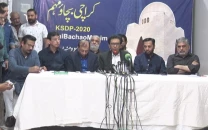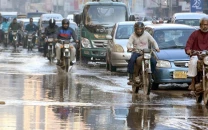When trouble hits, Karachi residents are needed close to home
Volunteers from Karachi aren’t heading to the camps closest to home.

According to members of the Karachi Relief Trust, a non-profit organisation providing relief to flood survivors around Sindh, volunteers prefer venturing up north rather than lending a hand in their own backyard. The trust is struggling to retain reliable volunteers who can help manage the teeming camps near Karachi, but there is a palpable frustration as the flow of volunteers has gone in the direction of the other provinces.
Salman Madani, who has taken leave from work to volunteer at several camps, discussed the irony of Karachi residents who fly to the northern areas to volunteer instead of addressing problems closer to home. “Rather than spending money on a plane ticket, you can always volunteer right here in Sindh,” he said.
One reason for this preference is the greater publicity and credibility associated with relief projects in the Punjab and Khyber-Pakhtunkhwa. “I think Imran Khan is doing the best job,” said Maha, who is considering volunteering with his foundation. “If I go, it’ll be because of him, I just think he’s doing the most work,” she said when asked about her decision to volunteer outside of Karachi.
For other volunteers, it is important to work with an NGO they trust and are familiar with. Batool Nathani, who traveled to Peshawar with Health Oriented Preventive Education (Hope), had worked with the organisation before. She chose to travel to Khyber-Pakhtunkhwa when its chairperson told her she needed volunteers there.
The fighting in the northern areas is another reason why people from Karachi have been drawn to KP’s far-off cities. There is a perception that the presence of the Taliban and the ongoing conflict has made flood survivors in this province more vulnerable. “I figured people were less willing to go up north to volunteer and I could help more over there,” said Batool.
Ironically, when the government sat down to assess the damage, it was said that Sindh has been the worst hit. For her part, Juvaria Jafri, a regular volunteer in Sindh, wishes more people would acknowledge the state of affairs in cities such as Thatta, which hopefully require only a few more weeks of attention before the internally displaced persons start returning home.
Not all NGOs have been short on help however. A member of the KaraHealth Welfare Association at Ziauddin Medical College said that luckily they had enough people because they were a medical school and therefore work year round. She agreed, however, that the general trend seems to be for the people of Karachi to leave the province to volunteer.
There are several advantages to working closer to home, especially for people new to the work. KRT members discussed the problem of first-time volunteers being unwilling to take the personal initiative of managing relief work themselves.
While larger NGOs offer a clear hierarchical structure, efforts made by organisations such as KRT require volunteers to identify problems and engineer solutions by themselves. “There is no hierarchy and ideally, volunteers will be able to walk into a camp, see a problem and take action,” said Jafri. “You can’t always be told what to do.” For younger volunteers especially, this can often be daunting.
Working in cities such as Peshawar can also be challenging. One woman described the language barrier between volunteers and survivors who speak only provincial languages, as well as the obvious dangers associated with working in conflict spots.
For the people of Karachi who may be weighing the pros and cons of volunteering in the interior, it might be a more logical choice to wrestle with problems closer to the city.
After all, with all the attention focused on the northern areas, survivors in Sindh have nobody to count on but people nearby.
Published in The Express Tribune, September 9th, 2010.



















COMMENTS
Comments are moderated and generally will be posted if they are on-topic and not abusive.
For more information, please see our Comments FAQ